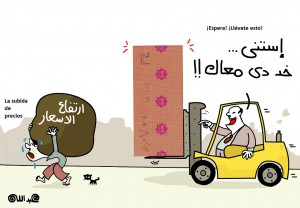Badr Jaafar , president of the development company Crescent Petroleum belonging to the Al Hilal Group, analyzed the main findings of the report recently published by the Energy Security Council of the Word Economic Forum in October 2013 entitled Lessons drawn from reforms of energy subsidies, noting the unintended adverse effects of energy subsidies. According to the report, in 2011, the International Energy Agency came to the conclusion that it is spending US$532 billion dollars to support energy in the world, leading to changes in market mechanisms. Moreover, recent research published by Standard Chartered Bank highlighted that energy subsidies in the Middle East and North Africa amounted to US$237 billion per year, i.e. almost half the total global energy subsidies.
In addition, the Security Council report provided a detailed analysis of the impact of energy subsidies in Jordan. In 2005, the state began to implement a program to reduce subsidies in order to gradually take away the support to the energy sector over three years. Although this period coincided with the rise in oil prices, the Jordanian government has eliminated most of the energy subsidies.
The Council’s report also stated that support to the energy sector cannot be removed suddenly, but must be done in stages as part of reforms at the level of all markets to increase the efficiency of market operations and stimulate innovation in the field of production and use of energy.
See full report: Lessons Drawn from Reforms of Energy Subsidies
Source: Zawya, 17/11/13







Aún no hay comentarios, ¡añada su voz abajo!